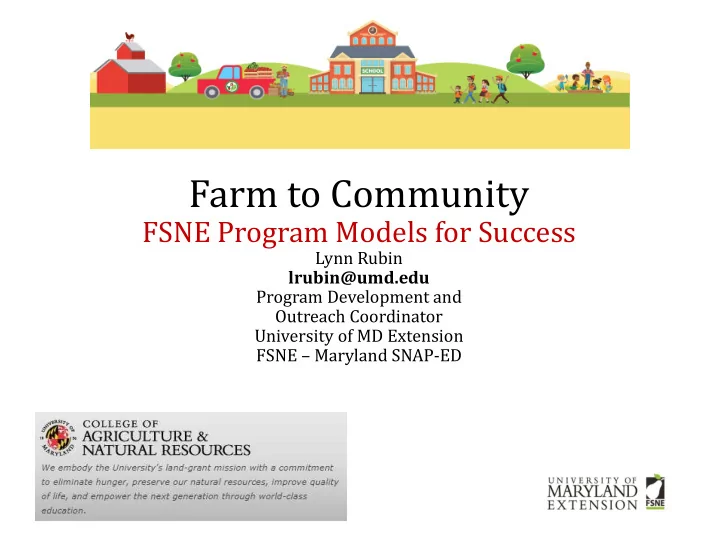

Farm to Community FSNE Program Models for Success Lynn Rubin lrubin@umd.edu Program Development and Outreach Coordinator University of MD Extension FSNE – Maryland SNAP-ED
Presentation Overview FSNE Initiatives FSNE Program Model FSNE Interventions Market Access Putting the Pieces Together Questions…and answers!
FSNE Initiatives Healthy School Community Farm to Family Healthy Tots Healthy Families Healthy Out of School Time Securing Food Resources for Families
Farm to Family Goals/Objectives Increase access/affordability of local, fresh fruits and vegetables Improve participants’ efficacy to select, store, prepare and eat a variety of fruits and vegetables Increase fruit and vegetable consumption Promote the farmers’ market across all program areas/initiatives
FSNE Program Model Multi-layer Interventions Policy, Systems, Environmental Change Designed to Increase Program Impact and Foster Healthy Communities
Farm to Family Interventions Market Access Promotion Farm to and School Outreach Farmers' Markets Nutrition Statewide Education at Partnerships Market Farmer Training
Farm to Family Intervention Sites Schools PreK/Headstart/Judy Centers Farmers’ Markets Food Pantries Summer Meal Sites Department of Aging Statewide Partnership SFMNP distribution sites WIC Statewide Partnership FMNP distribution sites and WIC clinics
FY17 Farmers’ Market Impacts Health-Promoting Policies, Systems, and Physical Environments:
FY17 Farmers’ Market Impacts 9 out of 10 participants ( 92% ) receiving Market to Mealtime education plan to buy or choose the produce they learned about from FSNE educators After participating in Market to Mealtime, 63% of participants take home more fruits and vegetables than they typically bring home from other food purchase or selection sites
FY18 Farmers’ Market Data 55 farmers’ markets partnered with FSNE in FY18 53% increase in collaborating markets from FY17
Market Education Matters Increased self-efficacy to select, store, prepare produce at home Value of tasting opportunities Improved navigation of market Increase in fruit and vegetable intake Improved health outcomes
Farmer Training Matters 2018 From Farm to Market Pilot Training Select markets in Frederick, Carroll, Baltimore, Harford, Anne Arundel, Prince George’s Farmers participated in training best practices • Signage and Displays Winter 2018-2019 Statewide Training Rollout • Regional trainings across Maryland • Includes 2 new content areas – Consumer Knowledge, Community Outreach Tools to increase produce sales
Environmental Changes at Market
Promotion and Outreach Shoppers Education at the market In the classroom Market Managers Market Your Farmers’ Market Increase access for shoppers Farmers From Farm to Market Training Marketing practices - $ell more! Increased $ales=Increased Consumption
Market Promotion through FSNE State Partnerships Maryland Department of Agriculture Maryland Department of Aging Maryland WIC Maryland State Department of Education Maryland Department of Human Services
Benefits Promotion FMNP/SFMNP eWIC SNAP/EBT Incentive Programs 2018 FMNP Brochure 2018 WIC Farmers Market Cookbook Farmers’ Market Incentive $$
Linking Farm to School – 3 C’s Cafeteria Homegrown School Lunch Farm to School Smarter Lunchroom Classroom Farmer Visits Gardening Local food systems Recipe demo and tasting Community Understanding Local Food Market Field Trips – youth and adult Healthy School Fundraisers
Cafeteria Smarter Lunchroom
Classroom
Community Market tours for kids and grown-ups too! Youth are the produce purchasers and consumers of the future!
FY17 Healthy Outcomes
Increasing Market Access Drive more consumers to the farmers’ market Outreach and promotion – print materials and text messages Payment acceptance in all forms • Cash, credit, debit, EBT, eWIC, FMNP Incentive programs (bonus bucks) attract SNAP shoppers and keep them coming back, week after week Education – recipe demonstration, sampling, print materials, opportunity to try and purchase new foods
Putting the Pieces Together Multi-layer interventions create healthier communities Education at the market Farm to School – 3 C’s Farmers’ market promotion and outreach Farmer training Statewide partnerships Welcoming market environment increases sales Produce sold at market meets community demand Multiple methods of payment accepted Incentive programs attract diverse shoppers and keep them coming back
What are your questions? Lynn Rubin lrubin@umd.edu Program Development and Outreach Coordinator University of MD Extension FSNE – Maryland SNAP-ED
Recommend
More recommend